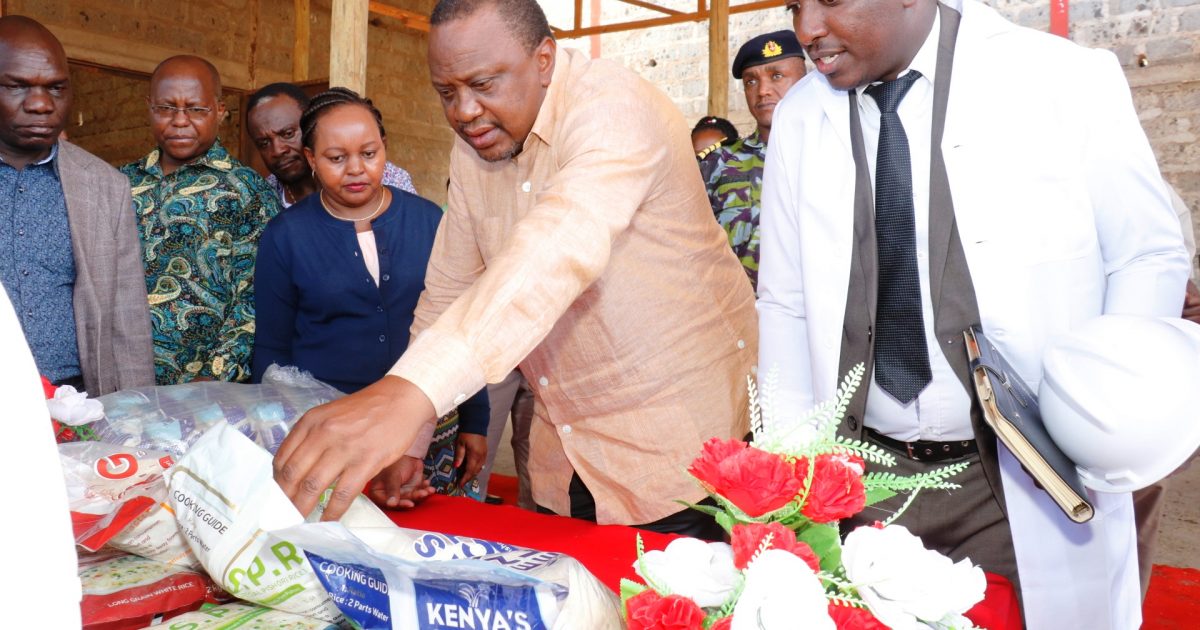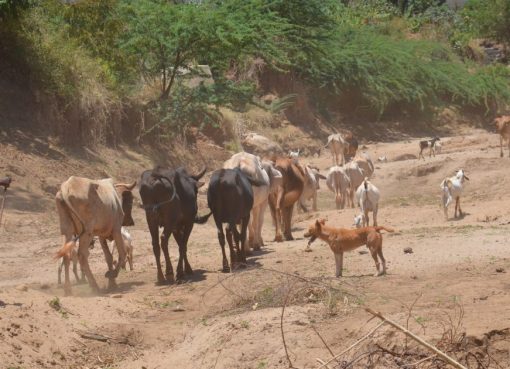
Mwea farmers are happy with the recent announcement by the government that a kilo of rice retails at Sh.85.
The announcement made by President Uhuru during his tour of Kirinyaga County last Saturday, will now see a kilo of rice rise from the previous Sh.55 to Sh.85, an increase of Sh.30.
The Cabinet Secretary for Agriculture (CS), Peter Munya says the deliberate intervention by the government in the purchase of excess rice is intended to drive bulk procurement and distribution of Kenyan rice to support local farmers.
“Kenyan rice has two varieties namely: Aromatic Rice, popularly known as Pishori and non-Aromatic Rice locally known as Sindano, which are of high quality compared to imported alternatives in the market place,” Munya said.
Munya said the aspiration of the stakeholders along the rice value chain and the intervention of the government will transform and enhance small-scale farmer incomes of individual farmers.
“We are targeting the aromatic Pishori rice which is mostly produced in Kirinyaga County’s Mwea area and is packed and distributed by various entities such as Mwea Growers Co-operative Society (MRGCS),” he said.
On the other hand, the CS said the non-aromatic Sindano rice from the Kano Plains which comprise of West Kano and Ahero Rice schemes in Kisumu County is also included in the market intervention programme.
“We are going to work with established societies like the Mwea Rice Growers Multipurpose Society Limited which serves a large pool of rice growers and they currently have over four million kilograms of premium graded Pishori rice in their stores,” Munya said.
He said the stocking levels are expected to rise to 6 – 8 million kgs in three months and further to 13 million by the end of March, 2020.
The society sells Pishori rice at an ex-factory price of Sh.150 per kg which will now rise to Sh.200 per kg of the milled rice.
“The Western Rice Mills drying floor handles 500,000 kgs of Sindano rice per season. The Mills sells the Sindano rice at an ex-factory price of between Sh.100 – Sh.120 per kg,” he said.
The CS said the biggest challenge for farmers has been in accessing markets for bulk purchases and the partnership with KNTC is to assist the Mwea Society and the Western Rice Mills by extension the farmers to channelize their products into the market to avoid glut upon harvesting of the next crop.
“Despite the productivity levels having risen substantially over time, market access for local rice remains a major challenge. Locally produced rice is comparatively of higher quality and more expensive compared to cheaper imports which continue to flood the local market,” Munya said.
He said market trends is indicative that Kenyan citizenry is more price sensitive than quality sensitive hence any product offered at attractive prices fetch good market penetration.
“The Government in its effort to safeguard its citizens and employment opportunities in 2015 developed the Buy Kenya – Build Kenya Initiative to spur market uptake of locally produced products,” Munya added.
This, partnership he said is anchored in the Buy Kenya – Build Kenya Initiative and is expected to upscale market development efforts needed to create pathways for Kenyan rice farmers to prosper.
He said the partnership areas include joint distribution of Kenyan rice through the Corporation’s depot network, Warehousing of Kenyan rice, joint awareness creation and marketing activities and distribution of rice-specific fertilizer at competitive prices to enhance productivity.
In line with its mandate, Munya said the Kenya National Trading Cooperation (KNTC) will procure the rice in bulk and avail to Government institutions at competitive prices.
The cooperation will also be involved in storing rice for the Government under the Strategic Reserve Scheme and in addition provide warehousing services for Mwea and Kano rice in various KNTC depots/warehouses serving as picking points for consumers, resellers, etc.
At the same time, the CS said rice will be retailed and wholesaled using the network of ten depots located in Nairobi, Nakuru, Karatina, Kisumu, Eldoret, Kitale, Kapsabet, Machakos, Wote and Meru.
He said the corporation transport unit will also be used to transport and deliver the rice to various parts of the country to offer commercial transport and logistics services to the Mwea and Kano rice cooperatives and other stakeholders.
Mwea and Kano Rice cooperatives will undertake buying rice in bulk from Mwea and Kano farmers, process and package milled rice.
They will also be involved in the supply of the rice to KNTC, and provide marketing budget for joint advertising.
The benefits of the entire programme, Munya said would be farmers getting increased value from the selling of the rice due to reduced brokers.
“Citizens will also readily access unadulterated and safe products, with the government ring-fencing employment opportunities and wealth generation opportunities in the country,” he said.
Other benefits include increased food security through enhanced rice production and existence of strategic reserve for rice.
“This project requires Government support in form of encouraging government Ministries, Departments and Agencies to patronize Kenyan rice distributed by KNTC which is mandated to serve as a procurement agent for Government and general public,” Munya said.
He said the joint initiative will boost the Government’s efforts in supporting local content as well as respective partners’ visibility and efforts in delivering on their Big Four Agenda’s Food Security Pillar, leveraging on each other’s immense resources and capacities to expand and grow future Kenyan rice business thereby creating opportunities for wealth and job creation in the country.
The launch and flagging of the rice buying initiative is a culmination of a presidential directive issued on January 14, 2020 designating KNTC as an anchor institution for procurement and distribution of Kenyan rice to Government institutions among others, and directing The National Treasury to release Sh.660 million to KNTC for the project.
By Irungu Mwangi




